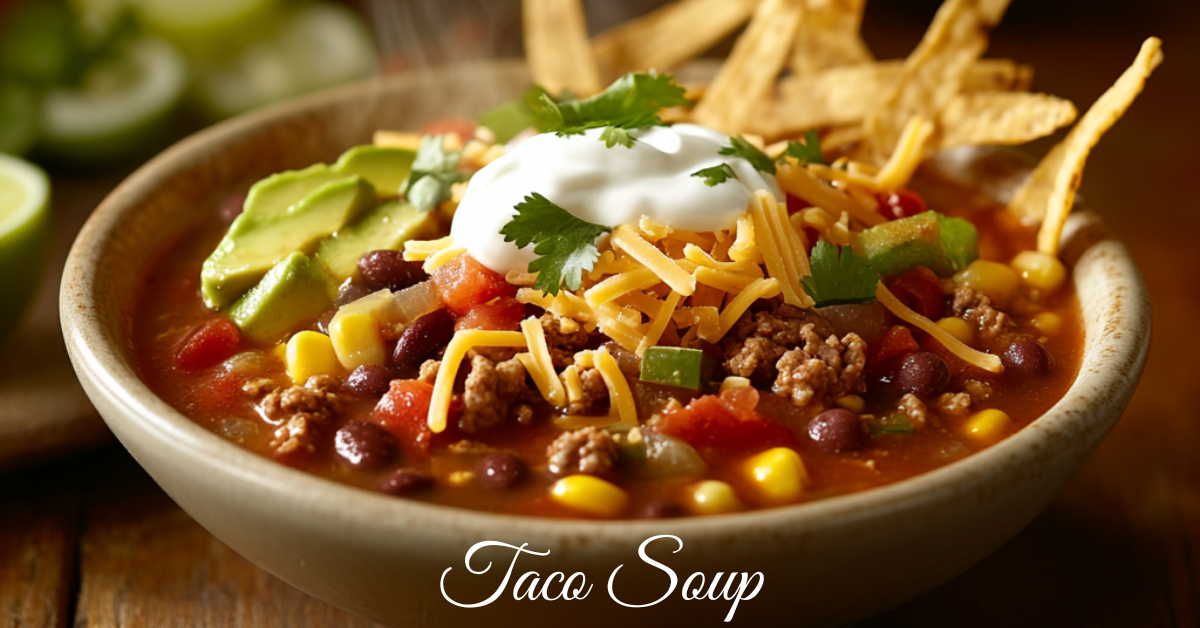Introduction to Taco Soup and Calories
Taco soup is a flavorful, hearty, and satisfying dish beloved for its unique combination of ingredients. It’s a Tex-Mex-inspired recipe that blends ground meat, beans, tomatoes, corn, and a mix of savory spices. Often served with toppings like shredded cheese, sour cream, and tortilla chips, this dish is both comforting and indulgent. But does taco soup have a lot of calories? This is a common question for those who want to enjoy its rich flavors while staying mindful of their dietary goals.
For those keeping track of their calorie intake, taco soup often raises questions: Does taco soup have a lot of calories? Can it fit into a calorie-conscious diet? Understanding the calorie count and nutritional value of taco soup can help you make informed choices and enjoy this dish guilt-free. For inspiration on preparing taco soup, check out this Taco Soup Frios Recipe, which offers a unique twist on the classic.
The Caloric Content of Taco Soup: A Detailed Breakdown
Average Caloric Range
On average, a standard serving of taco soup (1 to 2 cups) contains 200 to 350 calories. The calorie count depends on several factors, including:
- Ingredients: The type of protein (ground beef, turkey, or chicken), beans, and toppings used.
- Toppings: Cheese, sour cream, and tortilla chips can significantly increase the calorie count.
- Preparation Style: Homemade versions often have fewer calories than restaurant or store-bought soups due to better control over ingredients and portion sizes.
Ingredient-Specific Calorie Contributions
Let’s take a closer look at the key ingredients in taco soup and their respective calorie contributions:
Protein Options
- Ground Beef:
Regular ground beef contains 200–250 calories per serving. Choosing leaner cuts can reduce this to around 150–180 calories. - Ground Turkey or Chicken:
These leaner alternatives provide 140–180 calories per serving, making them a healthier option for calorie-conscious eaters.
Beans and Legumes
- Black beans, kidney beans, or pinto beans are staples in taco soup. Each cup adds 100–120 calories along with fiber and protein, which keep you fuller for longer.
Vegetables
- Tomatoes, corn, bell peppers, and onions are common in taco soup. These ingredients are low in calories but high in nutrients, contributing around 20–50 calories per cup.
Toppings
- Cheese: One ounce of shredded cheese adds approximately 110 calories.
- Sour Cream: Each tablespoon contributes about 50 calories. Using fat-free or low-fat options can reduce this significantly.
- Tortilla Chips: A handful (around 10 chips) can add 100–150 calories, depending on the brand.
For more details on how to adjust your recipe, check out How to Thicken Taco Soup to achieve the desired texture without adding unnecessary calories.
Is Taco Soup Higher in Calories Than Other Soups?
Compared to other soups, taco soup is moderately calorie-dense. Here’s how it compares to other popular options:
- Broth-Based Soups (e.g., vegetable soup):
Typically lighter, containing 50–150 calories per serving. - Cream-Based Soups (e.g., clam chowder):
Rich and heavy, with 300–500 calories per serving.
Taco soup falls in between these two extremes. Its calorie count depends largely on the choice of ingredients, toppings, and portion size.
Health Benefits of Taco Soup
Taco soup offers more than just its savory, satisfying flavor. It’s packed with nutritional benefits that make it a great addition to a balanced diet.
High in Protein
With its combination of beans and lean meat, taco soup is an excellent source of protein. Protein is essential for:
- Building and repairing muscles.
- Promoting satiety, which helps curb hunger.
Rich in Fiber
The beans, corn, and other vegetables in taco soup provide ample fiber. Benefits include:
- Improved digestive health.
- Stabilized blood sugar levels.
- Enhanced feelings of fullness.
Loaded With Micronutrients
The variety of vegetables in taco soup, such as tomatoes and peppers, offers a wealth of vitamins and minerals:
- Vitamin A: Promotes eye health.
- Vitamin C: Boosts immunity and skin health.
- Potassium: Helps regulate blood pressure.
For another fiber-rich and nutrient-packed meal, try Roasted Stuffed Bell Peppers, a dish that pairs well with taco soup as a light side.
How to Lower the Calorie Count of Taco Soup
With a few simple modifications, you can enjoy a lighter version of taco soup without sacrificing its flavor or texture. Here are some tips:
Choose Lean Proteins
Opt for ground turkey or chicken instead of ground beef to cut down on calories and saturated fat.
Add More Vegetables
Incorporate low-calorie, nutrient-dense vegetables such as:
- Zucchini
- Spinach
- Bell peppers These ingredients not only lower the calorie density but also increase fiber and nutrients.
Swap Out High-Calorie Toppings
- Replace sour cream with fat-free Greek yogurt for a similar creamy texture.
- Use a sprinkle of low-fat cheese or skip it entirely.
- Garnish with fresh herbs like cilantro or a squeeze of lime for added flavor.
Make Your Own Broth
Store-bought broths can be high in sodium and added sugars. Preparing your own tomato-based broth ensures full control over the ingredients and their calorie content.
Variations of Taco Soup
Taco soup is highly versatile and can be adapted to suit a range of dietary preferences. Here are some popular variations to consider:
Vegetarian Taco Soup
Replace the meat with extra beans, lentils, or plant-based meat substitutes. This version is high in protein and fiber while remaining low in fat.
Spicy Taco Soup
Add jalapeños, chipotle peppers, or a dash of hot sauce to elevate the heat. Capsaicin in spicy peppers can even boost metabolism.
Creamy Taco Soup
For a richer texture, stir in a small amount of low-fat cream or coconut milk.
Common Misconceptions About Taco Soup
“Taco Soup Is Always High in Calories”
While some recipes are calorie-dense, the calorie count depends on how the soup is prepared. Homemade versions using lean proteins and fresh vegetables can be a low-calorie option.
“Taco Soup Isn’t Healthy”
This is far from true. When made with whole, nutrient-dense ingredients, taco soup can be a balanced, healthful meal that provides protein, fiber, and essential vitamins.
Frequently Asked Questions (FAQs)
Is Taco Soup High in Calories Compared to Other Tex-Mex Dishes?
Taco soup is generally lower in calories than traditional tacos or nachos, especially when prepared with lean proteins and light toppings.
How Many Calories Does a Serving of Taco Soup Have?
A serving of taco soup typically contains 200–350 calories, depending on the ingredients and portion size.
Can I Eat Taco Soup While on a Diet?
Yes! By making smart ingredient swaps and controlling portion sizes, taco soup can be a delicious and satisfying addition to a weight-loss diet.
What Are Some Healthy Toppings for Taco Soup?
- Sliced avocado (rich in healthy fats)
- Fat-free Greek yogurt (as a sour cream substitute)
- Fresh cilantro and lime juice for flavor
Storage and Meal Prep Tips
Taco soup is an excellent make-ahead dish that stores well. Here are some tips for storing and reheating:
- In the Refrigerator: Store leftovers in an airtight container for up to 4 days.
- In the Freezer: Taco soup can be frozen for up to 3 months. Thaw overnight in the refrigerator before reheating.
- Reheating Tips: Use the stovetop or microwave to warm the soup, adding a splash of broth or water if it becomes too thick.
For more information on proper storage, visit How Long Can You Keep Taco Soup in the Fridge?.
Conclusion: Enjoy Taco Soup Without the Guilt
Taco soup can be as calorie-conscious or indulgent as you make it. By focusing on lean proteins, adding more vegetables, and controlling portion sizes, this Tex-Mex favorite can easily fit into a healthy diet.
Key Takeaways:
- Customize Your Ingredients: Opt for leaner meats and lighter toppings.
- Boost Nutrition: Add vegetables for fiber and vitamins.
- Practice Portion Control: Stick to a serving size of 1–1.5 cups.
For more creative recipes and Tex-Mex inspiration, check out Taco Soup Frios Recipe or other delicious ideas on Cuisin Recipes.

